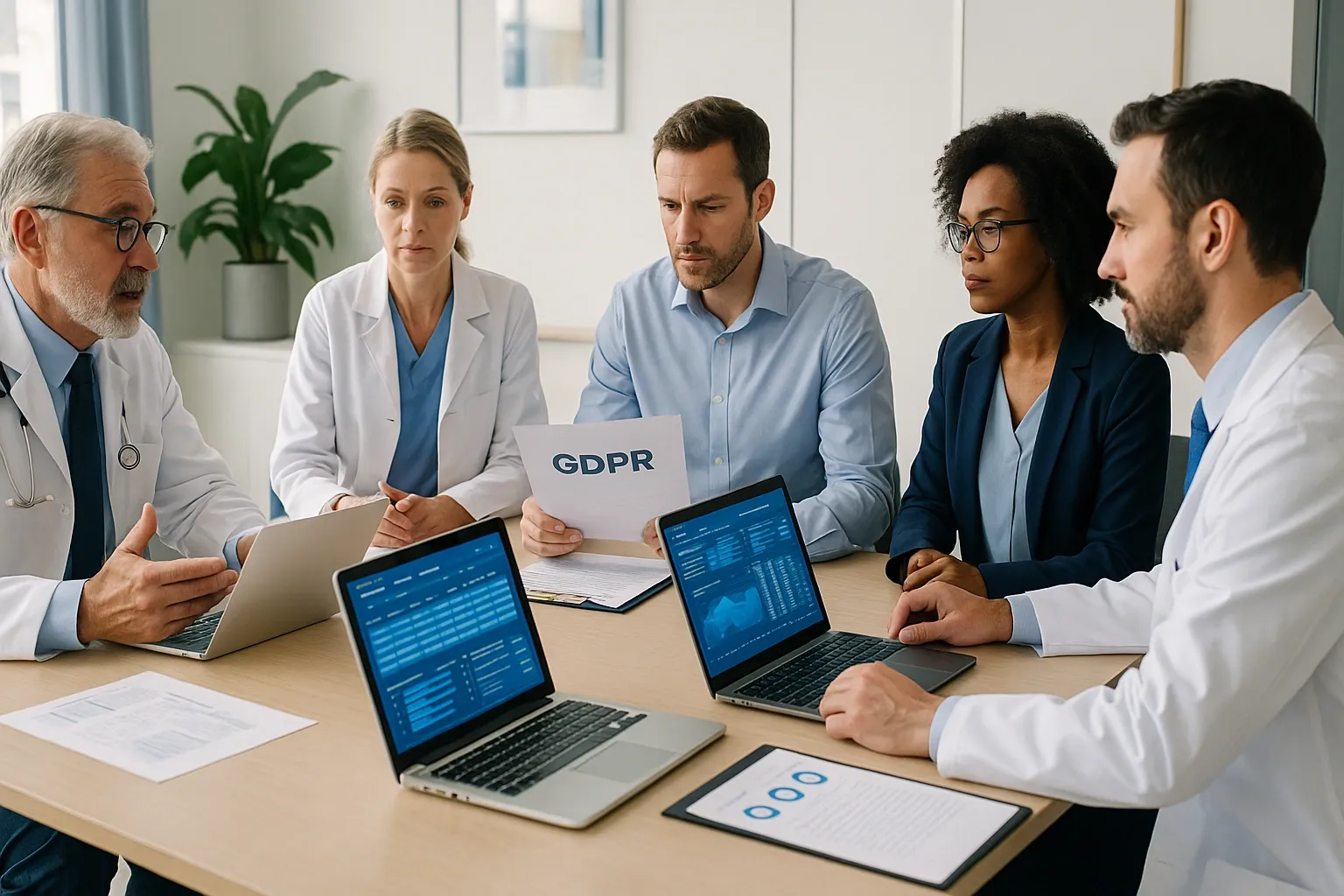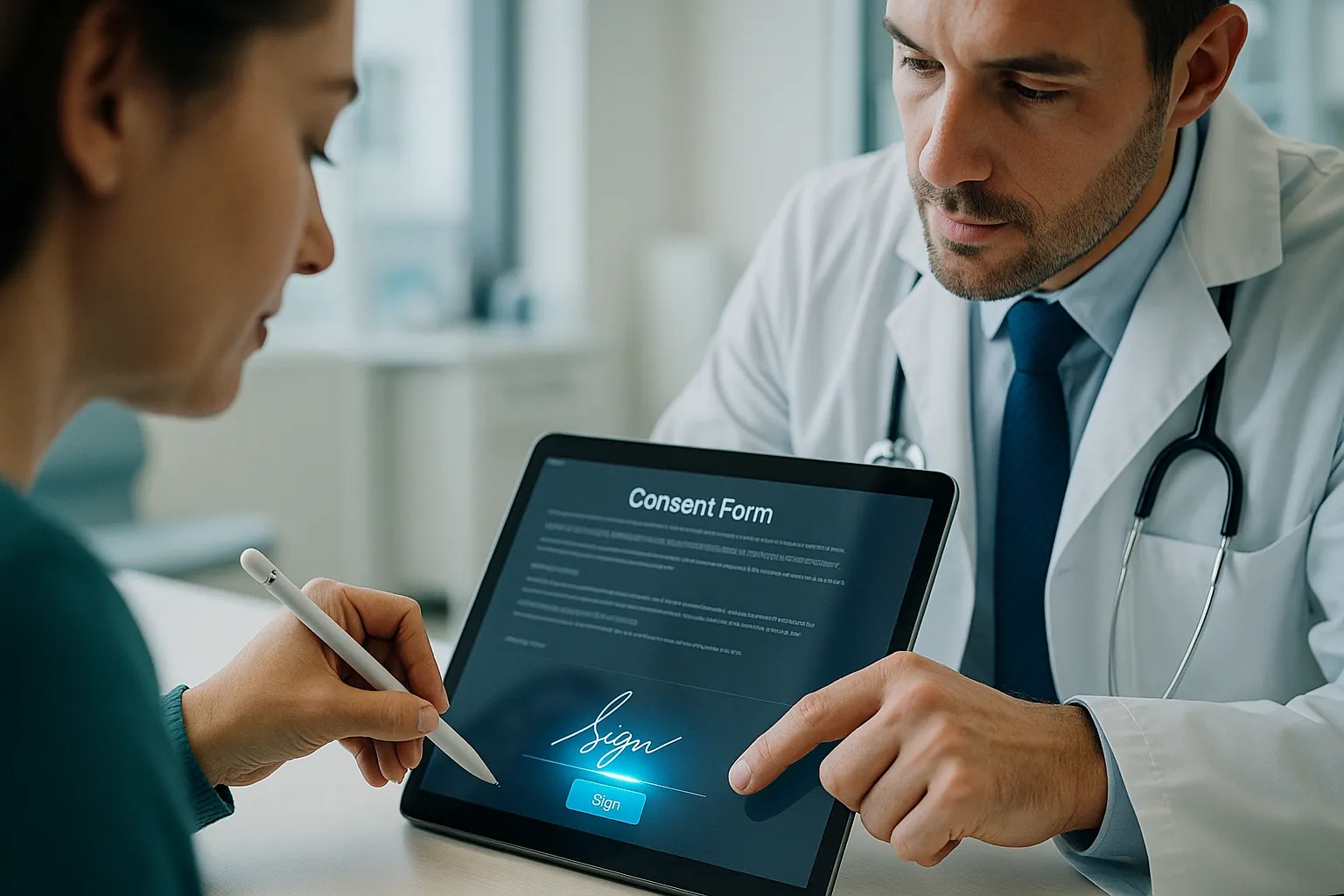
Data protection has become a central pillar in clinic management in Portugal. With the advance of healthcare digitalization — electronic health records (EHR), telehealth, online billing, cloud storage and integrations with external systems — compliance with the General Data Protection Regulation (GDPR) has never been more essential. In addition to ensuring legal security, proper compliance strengthens patient trust and protects the reputation of healthcare institutions.
Clinics that want to modernize operations, automate processes and integrate new technologies face an important challenge: how to grow digitally without compromising privacy? In this article we will explore how clinics in Portugal have been adapting to GDPR, which technological practices have become essential and how management solutions — such as Ninsaúde Clinic — help ensure compliance in a simple, scalable and secure way.
Before we continue, we need to ask: Are you already familiar with Ninsaúde Clinic? Ninsaúde Clinic is an intelligent software designed to simplify clinical management — combining an agile schedule, legally valid electronic health records, telemedicine, and complete financial control in one platform. Discover how Ninsaúde Clinic transforms daily operations and enhances patient care.

The impact of GDPR on the daily routine of Portuguese clinics
GDPR has brought deep changes to healthcare institutions, which are responsible for highly sensitive data. Any failure can result not only in heavy fines, but also in irreversible damage to patient trust and the clinic’s credibility. Because of this, technology and security have started to move together, with stricter rules, auditable processes and stronger internal policies.
As a result, adopting management systems aligned with GDPR has become indispensable. Today, clinics in Portugal look for platforms that offer access control, activity logs, data encryption and management of digitally signed documents — all to guarantee compliance without making daily operations more complex.

The role of technology in protecting health data
Technology is the foundation of modern security. Updated systems allow data to be stored in an encrypted way, apply strong authentication and eliminate unsafe practices such as using spreadsheets or physical files.
Digital tools also make it possible to automate security routines, such as backups, redundant storage and alerts for suspicious activity. This way, the clinic remains protected even in the face of technical failures, cyberattacks or human error.
Digital informed consent: security and traceability
GDPR treats consent as a critical element. It is mandatory to record the patient’s authorization for the use of their data, specifying purpose and type of processing.
Management software has started to incorporate electronic signature solutions and automatic recording of these authorizations. Ninsaúde Clinic, for example, integrates Ninsaúde Sign, which allows clinics to send consent forms, collect electronic signatures and store everything directly in the electronic health record — ensuring full traceability.

Access control: only those who must see, can see
One of GDPR’s principles is limiting access to the minimum necessary. Each staff member should only see information that is compatible with their role.
With modern systems, this is easy to configure. In Ninsaúde Clinic, it is possible to create specific profiles for front desk, billing, nurses, physicians, management and even different units within the same network. This reduces the risk of improper data exposure and strengthens compliance.
Encryption and secure cloud storage
Migration to the cloud is one of the main trends among clinics in Portugal. Encryption protects data end to end, preventing information from leaking even if there is an attack.
In addition, using secure, internationally certified servers increases robustness and service continuity. Although Ninsaúde Clinic is a Brazilian company, it serves clients in several countries and has an infrastructure prepared to meet international standards of security and compliance, including GDPR.
Ninsaúde uses more than 30 data centers distributed across South America, North America, Europe, Asia and the Pacific, and this distribution allows the platform to efficiently absorb distributed attacks. Ninsaúde Clinic’s infrastructure holds compliance certifications for several standards and controls and regularly undergoes independent third-party audits to validate data protection, privacy and security.

Activity logs: full transparency
Logs are fundamental in the GDPR context. They show exactly who accessed each piece of data, what was changed, when it was viewed and which actions were taken.
This level of traceability facilitates audits, reduces security gaps and increases internal accountability. Without logs, any clinic is more vulnerable to legal and operational risks.
Telehealth and GDPR: privacy in online appointments
The expansion of telehealth in Portugal required dedicated, secure platforms, since improvised tools can put sensitive data at risk.
Solutions such as Ninsaúde Clinic offer native telehealth integrated into the EHR, ensuring encrypted video visits that follow GDPR standards, without depending on external apps.
Internal policies and staff training
Even with advanced systems in place, human error remains one of the main risk factors. For this reason, clinics are investing in ongoing training on best security practices, proper use of systems, creation of strong passwords, identification of phishing attempts, care when sharing sensitive information and internal rules for accessing corporate or personal devices used within the clinic environment.
In addition, formal data governance and incident response policies are increasingly common. These include clear protocols on how to act in case of a breach, guidelines for communicating with patients and authorities, and preventive routines such as internal security tests and attack simulations. Building a culture of data protection strengthens security, increases individual accountability and significantly reduces the likelihood of failures — ensuring that technology is used in the safest and most strategic way possible.

Backups and disaster recovery
GDPR also reinforces the importance of data availability. This means the clinic must guarantee that access to information will not be interrupted in case of technical issues.
Systems with automatic backups, redundancy and fast recovery in extreme situations — such as ransomware attacks — become essential for keeping operations running without data loss.
The role of international software in the Portuguese market
In recent years, Portugal has benefited from the arrival of international, healthcare-focused software solutions that are born aligned with strict data protection regulations such as HIPAA (as an equivalent reference for Brazil’s LGPD) and GDPR in Europe. These solutions bring technological maturity, global experience and high security standards, helping accelerate the digitalization of Portuguese clinics with more robust, modern and sustainable tools.
Ninsaúde Clinic is one of these examples. Although it is a Brazilian software platform, it was designed from the outset to operate in multiple countries and adapt to the legal requirements of each region. In addition, Ninsaúde Clinic is structured to operate with international security standards, independent audits, advanced encryption protocols and strict access controls — elements that make it compatible with GDPR and highly reliable for Portuguese clinics that need scalable, secure technology that is ready for the future.
Audits and documentation: how to prepare for inspections
Clinics must be able to prove that they comply with GDPR requirements. This includes documentation on consent, contracts, logs, policies, data processing flows, backups and internal reports.
Management systems help organize these materials automatically, making the process easier and reducing the chance of errors.
Competitive benefits of technological compliance
Clinics that fully adapt to GDPR gain important competitive advantages. Patients value security, privacy and transparency — especially when it comes to health data.
Investing in technology, internal controls and secure integrations sets the clinic apart in the market, strengthens patient trust and reinforces the institution’s reputation.
Ninsaúde Clinic as a strategic compliance ally
Ninsaúde Clinic brings together everything Portuguese clinics need to operate securely: electronic health record, scheduling, telehealth, financial management, CRM, electronic signatures, document management and open API.
Because it is an international platform optimized for data protection regulations, it becomes a robust solution for clinics that want to digitize processes without compromising GDPR compliance.
Did you like this information? Then get ready for a continuous learning journey by following our blog. Are you a healthcare professional and don’t yet know the benefits of Ninsaúde Clinic? Stay ahead, optimize your processes, and raise the standard of patient care!

